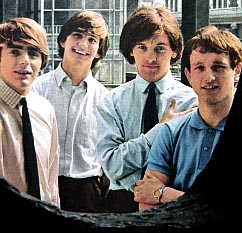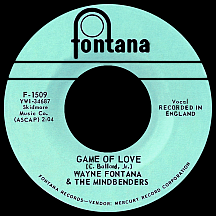WAYNE FONTANA AND
THE MINDBENDERS
Game of Love
It was a strange combination of disparate music business elements that, when combined, made millions of pounds (and similar additional dollar amounts). Manchester teenager Glyn Geoffrey Ellis started singing in the early 1960s using the made-up name Wayne Fontana ('cause he was a big fan of Elvis, whose drummer was D.J. Fontana). Rhythm and blues was his bread and butter until a songwriter from the far-off border city of El Paso, Texas by the name of Clint Ballard, Jr., who'd hit pay dirt several years earlier with "Ginger Bread" (a 'sugar...spice...naughty...nice' hit he and Hank Hunter had created for nose-pinching vocal stylist Frankie Avalon), offered up "Game of Love," pointing out the obvious origin of romance that '...started long ago in the Garden of Eden.' Glyn/Wayne put a band together, its name derived from an unusual source: The Mind Benders, a 1963 U.K.-made psyche-science feature film about brainwashing starring Dirk Bogarde (sorely in need of stronger material at that point in his career). To top it off, the group secured a contract with Fontana, a U.K. record company (named after the Italian word for "fountain") that Glyn had been unaware of when he modified his moniker. The stage was set for confusion...but then everything fell into place quite nicely.
While in his early teens our guy, still Glyn, was a member of The Velfins, a short-lived skiffle group. In 1962 he fell in with guitarists Jerry Morton and Stuart Sirett, drummer Ian Lucas and bassist Bob Lang; as Wayne Fontana and the Jets they appeared regularly in clubs around the Manchester area. In May '63, Fontana Records producer Jack Baverstock planned to audition the group at the Oasis Club on Lloyd Street in the heart of Manchester, where they'd been performing, but only Wayne and Bob showed up. Guitarist Eric Stewart and drummer Ric Rothwell were in the crowd that night and volunteered to sit in, a development that became permanent and reconfigured the newly-christened Wayne Fontana and the Mindbenders as a quartet.
Within weeks the first single, a delirious 'A-ha-ha-ha-ha-ha!' version of Fats Domino's "My Girl Josephine" retitled "Hello! Josephine," landed on the U.K. chart, though the next few remade R&B songs failed to connect. Their first top ten hit finally arrived more than a year later in the form of a casual guitar-based cover of the Major Lance hit "Um, Um, Um, Um, Um, Um" (issued in the States as The Mindbenders, it was the first appearance of this shortened name that would soon be more widely used). Clint Ballard had been enjoying his status as a pop composer with top sellers like "Good Timin'" (penned with Fred Tobias), a hit in 1960 for Jimmy Jones, and Betty Everett's breakthrough single "You're No Good," which was covered in '64 by Liverpool rockers The Swinging Blue Jeans, alerting Clint to the idea of selling his songs overseas.
"The Game of Love" landed with Fontana's group through New York publisher Skidmore Music. Their no-nonsense just-over-two-minute take shot to number two in February '65, going one better two months later when, as "Game of Love," it reached the top of the U.S. charts; two weeks after that it was part of the British Invasion's peak week when nine songs dominated America's top ten ("Count Me In" by Gary Lewis and the Playboys the sole holdout). Meanwhile, southwesterner Ballard was livin' large: he wrote "I'm Alive" specifically for The Hollies and they took the song to number one in England in July.

With a bang-up single, and despite the lukewarm reaction to the follow-up, "It's Just a Little Bit Too Late" (another Ballard tune), Wayne went the egocentric route and quit the band in October '65...in the middle of a live performance. The record company was fine with the notion of one act becoming two, while the (bitter?) 'Benders claimed all they'd lost was a tambourine player! The WF&M team was toast, Ballard's "She Needs Love," hitting in Britain as the split came about, via finis. Fontana had minor solo hits in his homeland (though little developed across the pond) with "It Was Easier to Hurt Her" and "Come on Home," and a bigger one in early '67, "Pamela, Pamela."
The Mindbenders fared much better with their first post-separation effort, "A Groovy Kind of Love," written by American songwriters Toni Wine and Carole Bayer Sager; Toni became a prolific session singer, best known as a voice (Betty - or Veronica?) in The Archies and Carole penned many hits in the '70s, often working with her husband, Burt Bacharach. The just-under-two-minute "Groovy" love song, establishing Eric Stewart as the new lead singer (how many noticed the change, I wonder?), reached number two in both the U.K. (in March 1966) and U.S. (in May). "Ashes to Ashes," another Bayer-Wine song, sold decently in both countries; the band lip-synced two of their songs ("It's Getting Harder All the Time" and "Off and Running") in To Sir, With Love, the Sidney Poitier-goes-to-London film smash that fared better on the musical front for costar Lulu (her recording of the title song was...well, you know). One final Mindbenders single, an anemic cover of The Box Tops' "The Letter," found the bottom rungs of the U.K. charts a bit slippery in the fall of '67. The three-man band called it quits the following year.
Overall, Eric Stewart had the most successful career. He joined keyboard player Lol Creme and drummer Kevin Godley in Hotlegs, resulting in a primitively appealing hit, "Neanderthal Man," in 1970. Guitarist Graham Gouldman joined later and the band emerged as 10cc, kicking off a successful run with the 1972 hit "Donna," crossing to America in 1975 with "I'm Not in Love." Wayne Fontana and the Mindbenders were back in business in the mid-'70s when Wayne reclaimed the group's name and assembled a new band.


